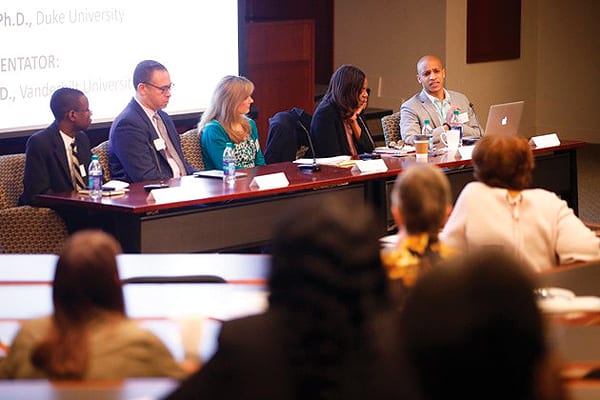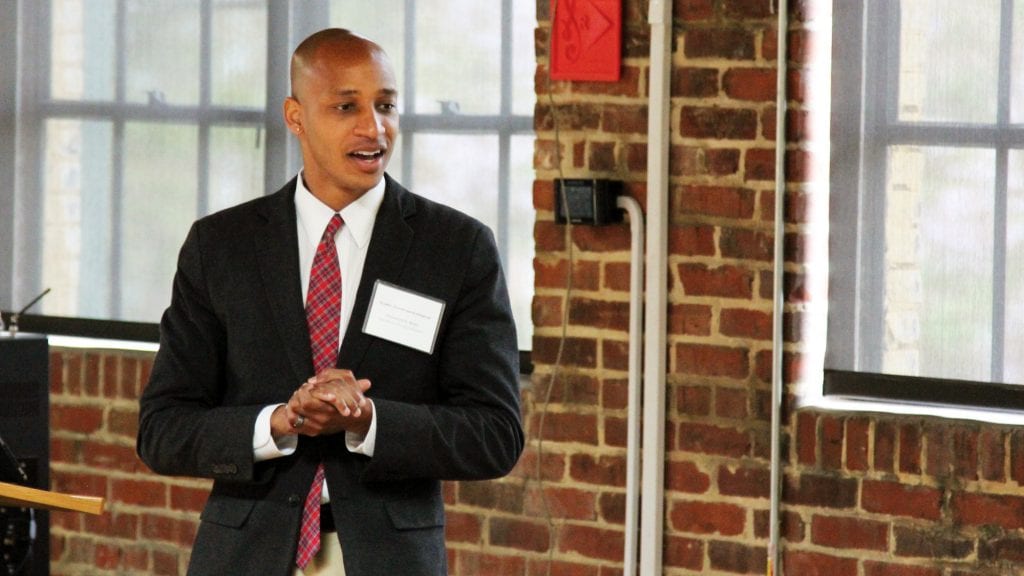Brandon Byrd’s (’05) love of history has deeply personal roots.
For Byrd—Assistant Professor of History at Vanderbilt University, accomplished researcher, and published author—these stories were always relevant beyond mere familial anecdotes. They represented much larger stories, and more complex histories, including some of the most defining moments in African American history.
“My mom talked a lot about the Great Migration—the movement of tens of thousands of African Americans out of the Jim Crow South to the North, Midwest, and later to the West—that her family was a part of,” Byrd offers as an example. “It was those larger historical narratives—those that I had a personal connection to—that attracted me, intrigued me.”
“I came to an initial interest in history the way a lot of folks do—by just generally taking an interest in my own personal history,” muses Byrd. “I was enamored by the stories that my family would share and pass down, stories of my grandparents’ and great grandparents’ experiences, all of whom passed before I was born or shortly thereafter.”
He credits Cary Academy—and the engaged, collegiate-quality faculty that took an interest in him, both in and out of the classroom—for nurturing that initial interest, fanning it into a passion that would ultimately become the bedrock of
a meaningful humanities career.
“Being a historian now, I can clearly trace the influence that CA faculty—Conrad Hall, Joe Staggers, Bill Velto, and others—had on my thinking. They taught me to approach history in a more systematic manner, taught me how to go from merely consuming stories to thinking historically, to thinking about change over time, to thinking about causality.”
He fondly recalls one of his literature teachers in the Upper School, Chuck Burdick, to whom he had expressed a growing interest in slave narratives and abolitionist literature.
“He took me on a book talk and signing by a historian that had just published the first biography of Harriet Jacobs, the author of Incidents in the Life of a Slave Girl,” reflects Byrd. “For someone to take that interest, to take time out of their personal life to help an (at that time) pretty brash, cocky high school student pursue his interest—it was impactful.”
It is perhaps little surprise that Byrd—embarking on his college career at Davidson College on an academic scholarship—confidently declared his major in history within his first weeks on campus. Later, he gained admittance into the honors history program, which allowed him to spend a year developing an independent research project to explore the life of Charles Clinton Spaulding, a prominent black businessman and intellectual leader in Durham, North Carolina.
That project would prove to be a springboard, offering a deeper introduction to the black intellectualism that would ultimately become the focus of his career. This early work would go on to inform his later research as he earned a Master’s degree from the University of William and Mary, and PhD from the University of North Carolina.
Byrd identifies first and foremost as an intellectual historian. Fascinated by the history of ideas, his specific research centers on the international dimensions of black intellectual history. As a professor, first at Mississippi State University and, currently, at Vanderbilt University, he teaches a full course load—including classes like “Black Lives Matter,” “Black Thinkers from Equiano to Obama,” and “Readings in African American History”—to undergraduate and graduate students. He also pursues his research agenda and contributes to the administration of his department and the university.
Byrd sees reflections of Cary Academy in his approach to teaching. No more so than when he’s pushing the pedagogical envelope, asking students to think critically or in ways that might question
a predominant narrative.
“I remember taking Bill Velto’s class on terrorism in the years immediately following 9/11,” reflects Byrd. “It was a moment when the general American public was being asked to think pretty uncritically about terrorism. They were having terrorism defined for them and they were being told ‘this is what it is to combat terror.’ In Velto’s class, we were being asked to think more critically, to consider the global roots and terms of terrorism. In hindsight, it was remarkable.”
It is an approach that stuck with him. He notes that his Black Lives Matter class, while dissimilar in content, shares its pedagogical roots in those early liberal arts classes at CA that initially stretched his thinking.
“The Black Lives Matter movement is also something defined largely in sweeping, generalized, and reactionary terms,” explains Byrd. “In my class, I try to take that and say ‘Well, let’s try to think about this. What is this movement? How does it fit into a broader global history of activism? What are the problems related to it? What can we learn if we stop assuming that we already know the answers?’”
That emphasis on the global, on the broader context, is indicative of Byrd’s larger research interests. For Byrd, examining historic African American intellectuals within their full global context—understanding how they and their ideas moved across and transcended national boundaries and how that, in turn, shaped their politics and intellectual practice—is crucial.
“There has always been a global dimension to African American history,” explains Byrd. “If we want to truly understand historical black intellectuals, truly understand the world as they saw it, we have to think in international terms, in part because that is how they identified within their world.”
He continues, “Take the abolitionists, for example. They didn’t view slavery as an institution that was peculiar to the South, or even peculiar to the United States. Their activism was based in a broader understanding of slavery’s international dimensions—how it was rooted in global networks of trade and commerce that connected Africa to Liverpool, England to merchants in New York to slaveholders in Georgia.
“And, that’s just one example, you can easily pull out others from across the decades,” explains Byrd. “The civil rights activists of the 1950s and ‘60s, the Black Power advocates of the ‘70’s, they all used similar transnational thinking. For them, thinking about desegregation meant also thinking about decolonization in Africa. It’s why, for a famous example, Dr. Martin Luther King, Jr. was in Ghana on the day of Ghanaian independence in 1957.”

For Byrd, his research feels particularly timely, helping to explain and understand not only the past, but the current fraught historical moment, perhaps even offering strategies for future activism.
“Black intellectuals have historically grappled with complex issues that transcend time and context: slavery; equality; what democracy means, how it can be achieved, and for whom; how to affect political change. Their thinking on these topics is all still incredibly relevant today and probably will be in 100 years,” offers Byrd.
“Consider Frederick Douglass questioning the project of America in his famous address What to the Slave is the Fourth of July?. Then, look at the headlines, the uproar over Colin Kaepernick kneeling during the national anthem. Suddenly, in that context, the use of that moment does not come as a surprise nor does the backlash or the continued insistence on activism.”
As for what is next for Byrd, he is excited that a project that began as his dissertation will soon be shared with the world as a book. The Black Republic: African Americans and the Fate of Haiti considers the significance of Haitian independence in the imagination of black intellectuals grappling with the possibilities of black freedom in the decades following the U.S. Civil War. It will be published this fall by the University of Pennsylvania Press.
This summer, he is digging into a new book project that will delve deeper into the social dimensions of black intellectualism through a multi-generational family history of the Holly family. Patriarch James Theodore Holly led a migration of African Americans from the United States to Haiti in the 1860s and would become the first black bishop in the Protestant Episcopal Church. His descendants represent a long family tradition of black intellectualism and transnational activism.
With this new research, Byrd hopes to gain insight into the intimate spaces of political movements and how genealogies of activism and political thought are built.
“One of the benefits of the family history angle is that, rather than just the church or the political office, I can consider the home as a central space
of inquiry.”
The inclusion of the home as a political space allows Byrd to delve deeper into the dimensions of his work that he finds most gratifying, most important, and perhaps most challenging: finding and elevating marginalized voices—particularly the voices of black women—whose inclusion offers a more holistic understanding of history.
“Finding voices of black women—many of whom were intentionally silenced for various reasons or who chose not to speak out in eras where visceral racism and patriarchy was the norm, even within black organizations—is challenging,” comments Byrd. “But, you have to find them. Folks that are on the margins of the archives—due to reasons of power, race, gender, or sexuality—were often at the center of the thinking and the action.”
It is when Byrd gives voice to those marginalized figures and pieces together a historical narrative that reflects their true experience—an important step in advancing our understanding of both past and present—that he feels he is inching closer to his goal.
“With my work, I am standing on the shoulders of scholars and historians who came before me. Scholars like John Hope Franklin and W.E.B. Du Bois contributed an almost unthinkable amount of knowledge about African American, U.S., and global history in an era where they couldn’t even go into archives,” offers Byrd.
“I don’t have the hubris to say that I am going to offer the same paradigm-shifting work that they delivered, but I think I can nudge us forward. I can help us think differently about aspects of African American history, its transnational dimensions, what it means to the past, and offers for the future. To me, that is a worthy and exciting goal.”

